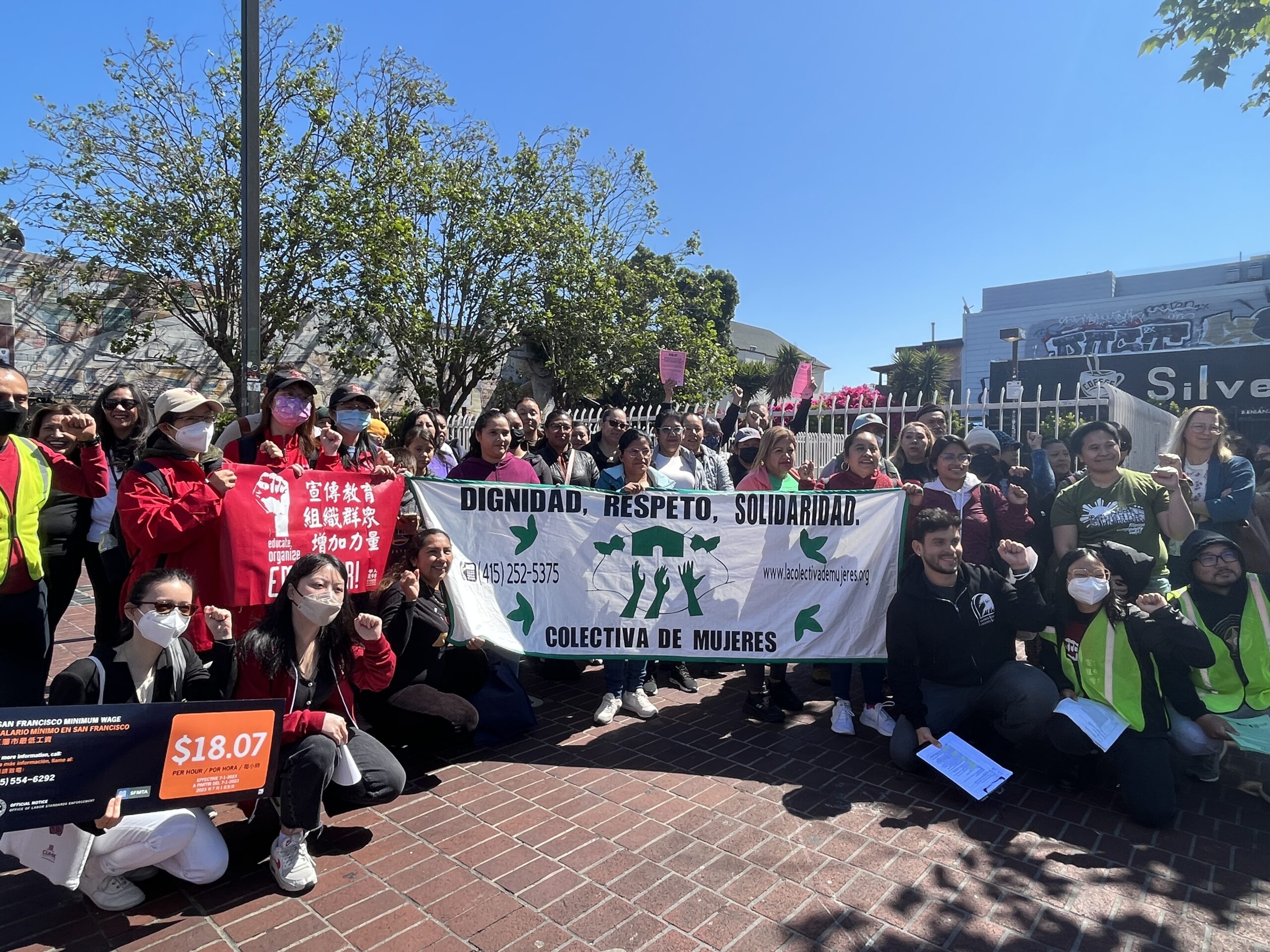SAN FRANCISCO – Today, the Workers Rights Community Collaborative (WRCC), a multiracial
coalition of working people rallied outside the 24th and Mission BART station to mark the city’s
minimum wage raise on July 1st. Workers from the restaurant, day laborer, domestic work,
hospitality, caregiving and other service sectors spoke in Spanish, Cantonese and English about
the importance of wage increases at a time of record inflation, as well as the importance of
enforcement of workers’ rights.
Starting on July 1, 2023, the minimum wage will increase to $18.07, up from $16.99 in
accordance with the Consumer Price Index. This comes during an endemic and record inflation,
all while workers are still attempting to recover economically from job losses and unemployment
in the past three years.
“This is an improvement for workers, but we must also call on all employers to abide by labor
laws and let the increased wages be implemented,” said Yanxiao Tan, a community member
from Chinese Progressive Association. “In addition to the increased minimum wage, adequate
workplace and safety net protections, such as workplace health and safety, unemployment
benefits, and medical insurance, are also important for worker protection, especially for
immigrant workers, who become the object of exploitation by the boss.”
In addition to the minimum wage increase, new ordinances have passed in the last few years,
such as the Family Friendly Workplace Ordinance, which grants workers who have caregiving
responsibilities a flexible work schedule and a timely supervisor response to time off requests.
With the passage of new laws, city officials must ensure that people of color, immigrants, those
who work in low-wage sectors, including the informal economy, app-based work, and high
violation industries are able to exercise the same rights as their highly paid counterparts in the
city of San Francisco. In order to ensure that workers understand recent laws and are able to
exercise their rights , the city must adequately fund enforcement of these laws, as well as
worker outreach and education.
“With the high costs of living here in San Francisco and increased inflation, it is much harder to
get by,” shared Tita Cory, a worker leader from the Filipino Community Center. “I had coworkers
at my previous work be paid less than $15 an hour this year. I can’t believe agencies like my
previous employers can terminate you whenever you want for no reason even though we work
hard for the company and follow all of the rules, but we still get treated like we are disposable.
Employers are taking advantage of workers who are in need of a job in this economy, but have
only been met with more exploitation and denial of their basic rights as a worker.”
Violations of minimum wage, paid sick leave, and other basic benefits continue to be an issue
for workers in low wage industries. In order for San Francisco to continue its leadership in
progressive labor policies, it must ensure those policies benefit the workers with the least
protections.
After carrying the city through the pandemic, working-class families are already hanging on by a
thread. For San Francisco to truly recover, we must protect our working class and marginalized
communities’ most urgent needs. Our workers are safe and protected when they are free from
wage theft, know their rights to speak up in face of retaliation, and are treated with dignity and
respect.
“The day I was paid for my owed work hours, I told my coworkers, “demand your working hours
and the minimum wage, keep demanding until you get paid”, said Trabajadores Unidos Workers
United member Maria Venegas. “I have seen that most jobs are like this. But the rest of us didn’t
come to this country to be rich, but to take care of the family and have a better life. The sun
shines for everyone. And everyone has to have the same opportunity. If we help each other, the
stronger we will be as workers.”
About the WRCC:
The Workers Rights Community Collaborative (WRCC) is contracted through the Office of Labor
Standards Enforcement (OLSE) to conduct outreach and education to workers about their
rights. The WRCC consists of:
● Advancing Justice – Asian Law Caucus
● Chinese Progressive Association
● Dolores Street Community Services
● Filipino Community Center
● La Raza Centro Legal
● South of Market Community Action
● Trabajadores Unidos Workers Unite



























